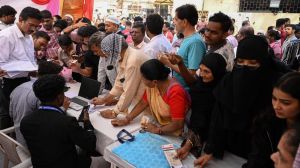Tribesmen at play
Bobby Kooka8217;s Air India map of India of the 19508217;s and 608217;s carried lively caricatures of turbaned Pathans popping playfully ...

Bobby Kooka8217;s Air India map of India of the 19508217;s and 608217;s carried lively caricatures of turbaned Pathans popping playfully in and out the high Himalayas with shining guns, good humouredly marked 8216;Tribesmen at Play8217;. The Indian film screen Pathan too, was transparently honest, his heart weighted in favour of the underdog. Looking through my late uncle Eric Massey8217;s memorabilia, I came across some true stories of these doughty, warm-hearted men.
One lazy morning, in the early 19008217;s, young Eric Massey decided to go for a leisurely two or three hour phaeton drive from Connaught Place, to the Qutab Minar, their horse clip clopping its way through scrubland and forest. Mr Wesley, his fellow passenger, an elderly Englishman, regaled him with these endearing tales of the Pathans of the North West Frontier.
The Wesleys and their four year old daughter were camping one night near the Khyber Pass, when some Afridis entered stealthily, lifted the sleeping child with her small cot, and disappeared into the night. The jolting woke the child who set up a wail. Her captors8217; unsuccessful efforts at quietening her, only made her scream louder. Finally they realised that she only wanted to walk with her captors and not be carried! Pleasantly surprised, they walked at her pace to their hideout and gave her hot food. She was soon fast asleep on their softest mattress. Meanwhile the parents, beside themselves with grief, suddenly became aware of a large Pathan who seemed to have materialised out of nowhere. Awkwardly and almost apologetically, he thrust a note with 8216;Rupees 50008217; scrawled laboriously on it, into their hands. Frenzied confabulations with other campers produced the large sum. The smiling captor assured them of their daughter8217;s safe return the coming morning, warning them in graphic mime not to follow him if they valued her life. After an anxious night, the little heroine of the piece skipped back with the dawn, excitedly telling her unbelieving parents of the wonderful time she had had and the soft mattress she had slept on!
Near the Wesley8217;s camp was a clinic. A Pathan blazing with fever entered and fell on the bed. The worried nurse stuck a thermometer in his mouth and ran to call the doctor. By the time they returned, the patient8217;s mouth was full of blood. The shocked nurse washed his mouth as he glared at her. 8216;8216;You put bad medicine. I eat. Cut my mouth, I spit blood! Look!8217;8217; The doctor attended to him and asked him when he had taken a bath. 8216;8216;Bath?8217;8217; he said aghast, 8216;8216;Never!8217;8217; seeing the horror on the doctor8217;s face, he quickly added, 8216;8216;My son, he like you! He one bath every month!8217;8217;
These tales started Eric off on his own brother8217;s experiences with the Pathans during the 1914 World War. Alfred Massey had been commissioned to organise sports for the Indian army personnel at Chaman in Baluchistan. One night when all was quiet, hundreds of Pathans crept stealthily into the lines and silently cut the support ropes that held up all the corrugated iron roof sheets. These were deftly collected in piles and carried quickly and soundlessly to their villages over the border, where their houses badly needed permanent roofing! Immense pains were taken not to injure any of the soldiers who slept peacefully on, waking the next morning wondering at the clear blue sky above them! The same story was repeated a while later with tents that were needed for tribal homes across the border. Not a drop of blood was shed. Their 8216;enemy8217; literally never lost any sleep because of these thoughtfully organised raids! Now I smile when the fruit seller repeats his great grandfather8217;s call as he spreads his grapes before you, 8216;8216;Chaman ke angoor!8217;8217; he calls. He is unaware that the world has moved on from a courteous age that once lived by an honourable code, and grapes no longer come to us from Chaman.
- 01
- 02
- 03
- 04
- 05































